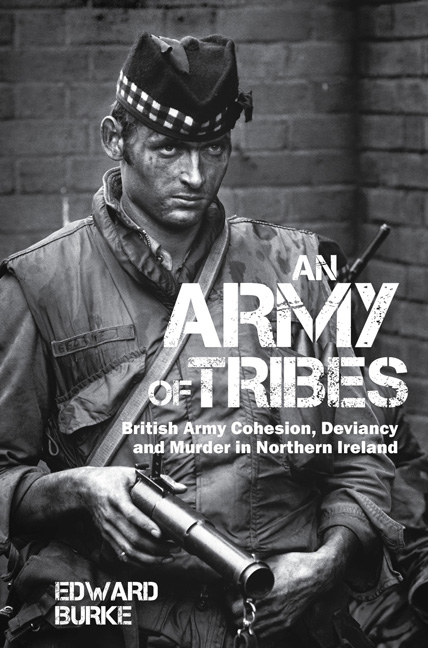Book contents
- Frontmatter
- Contents
- Preface
- Acknowledgements
- List of Abbreviations
- Maps
- Introduction
- 1 The British Army Before 1971
- 2 The Political and Operational Environment in Northern Ireland, 1969–1972
- 3 The Scots Guards and Argyll and Sutherland Highlanders Regiments in Northern Ireland, 1971–1972
- 4 Murder: The Killing of Michael Naan and Andrew Murray
- Conclusion
- Bibliography
- Index
Introduction
- Frontmatter
- Contents
- Preface
- Acknowledgements
- List of Abbreviations
- Maps
- Introduction
- 1 The British Army Before 1971
- 2 The Political and Operational Environment in Northern Ireland, 1969–1972
- 3 The Scots Guards and Argyll and Sutherland Highlanders Regiments in Northern Ireland, 1971–1972
- 4 Murder: The Killing of Michael Naan and Andrew Murray
- Conclusion
- Bibliography
- Index
Summary
The aim is not to show how the decisions of a few generals affected thousands of soldiers but, rather, how the decisions of thousands of soldiers affected a few generals.
‘The Army is a collection of semi-nomadic tribes’, said a gunner brigadier. A cavalry general spoke of the different combat arms as ‘collections of wigwams round a totem pole which they spent their time polishing’.
Michael Howard, one of Britain's leading thinkers on military affairs and strategy, was reluctant to describe the conflict in Northern Ireland as a ‘war’, preferring to see it as ‘an emergency’. Howard's limited definition was politically motivated: he wished to minimise Irish Republican Army (IRA) violence as a domestic ‘law and order’ issue. Howard was understandably concerned that if the public was told that Britain was ‘at war’ in Northern Ireland, an expectation would grow for either an all-out victory, meaning an escalation of State violence, or withdrawal – exactly the type of short-term duality that played into the hands of the IRA. Moreover, war, with all its horrors, is also not something that should be contemplated within one's own country, against one's own people. The author Elizabeth Bowen, writing about the earlier Anglo-Irish conflict of 1919–1921, captured a similar hesitancy to apply language reserved for international wars to an insurgency within the borders of the United Kingdom – ‘Oh but one wouldn't call it a war … If anyone would, we would clean these beggars out in a week.’
Britain, at least, had a short memory when it came to conflict within the British Isles. The vice chief of the general staff of the Army during the early years of Operation Banner, Lieutenant General Sir Cecil ‘Monkey’ Blacker, recalled that the fatal shooting of a solider in Londonderry in early 1971 profoundly shocked the Army (and British society more widely):
Looking back over more than twenty years, across the gulf which has since swallowed thousands of lives to the point when such news hardly earns a comment, I still remember the cold chill of horror which struck me – here, unbelievably, here in Great Britain, in one of our streets in our own country, a British soldier had been killed in action.
- Type
- Chapter
- Information
- An Army of TribesBritish Army Cohesion, Deviancy and Murder in Northern Ireland, pp. 1 - 32Publisher: Liverpool University PressPrint publication year: 2018



